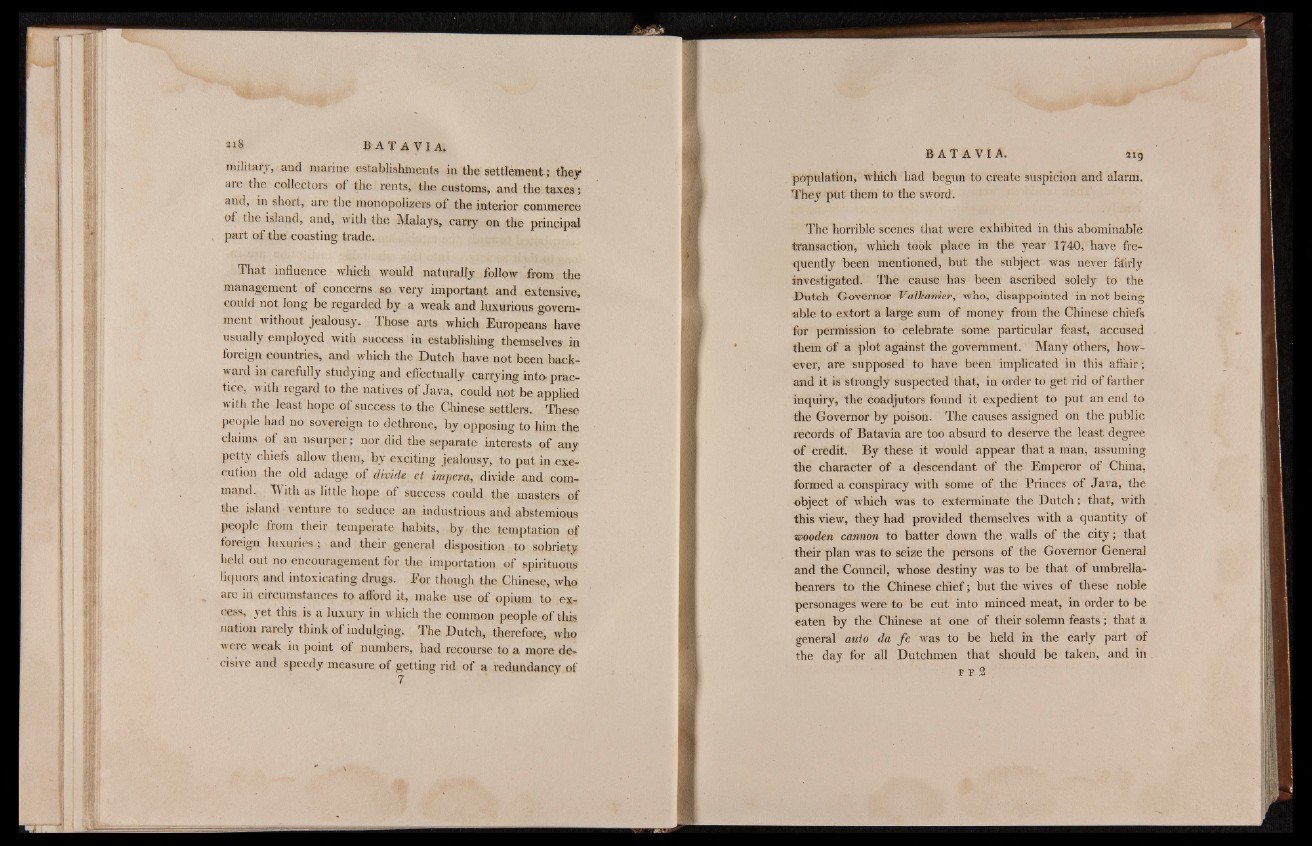
military, and marine establishments in the settlement; they
are the collectors of the rents, the customs, and the taxes;
and, in short, are the monopolizers of the interior commerce
of the island, and, with the Malays, carry on the principal
part of the coasting trade.
That influence which would naturally follow from the
management of concerns so very important and extensive,
could not long be regarded by a weak and luxurious government
without jealousy. Those arts which Europeans have
usually employed with success in establishing themselves in
foreign countries, and which the Dutch have not been backward
in carefully studying and effectually carrying into practice,
with regard to the natives of Java, could not be applied
with the least hope of success to the Chinese settlers. These
people had no sovereign to dethrone, by opposing to him the
claims of an usurper; nor did the separate interests of any
petty chiefs allow them, by exciting jealousy, to put in execution
the old adage of divide et impeva, divide and command.
With as little hope of success could the masters of
the island ventuie to seduce an industrious and abstemious
people from their temperate habits, by the temptation of
foreign luxuries; and their general disposition to sobriety
held out no encouragement for the importation of spirituous
lic]uors and intoxicating drugs. Eor though the Chinese, who
are in circumstances to afford it, make use of opium to excess,
yet this is a luxury in which the common people of this
nation rarely think of indulging. The Dutch, therefore, who
were weak in point of numbers, had recourse to a more decisive
and speedy measure of getting rid of a redundancy of
7
population, which had begun to create suspicion and alarm.
They put them to the sword.
The horrible scenes that were exhibited in this abominable
transaction, which took place in the year 1740, have frequently
been mentioned, but the subject was never fairly
investigated. The cause has been ascribed solely to the
Dutch Governor Valkanier, who, disappointed in not being
able to extort a large sum of money from the Chinese chiefs
for permission to celebrate some particular feast, accused
them of a plot against the government. Many others, however,
are supposed to have been implicated in this affair;
and it is strongly suspected that, in order to get rid of farther
inquiry, the coadjutors found it expedient to put an end to
the Governor by poison. The causes assigned on the public
records of Batavia are too absurd to deserve the least degree
of credit. By these it would appear that a man, assuming
the character of a descendant of the Emperor of China,
formed a conspiracy with some of the Princes of Java, the
object of which was to exterminate the Dutch; that, with
this view, they had provided themselves with a quantity of
wooden cannon to batter down the walls of the c ity ; that
their plan was to seize the persons of the Governor General
and the Council, whose destiny was to be that of umbrella-
bearers to the Chinese chief; but the wives of these noble
personages were to be cut into minced meat, in order to be
eaten by the Chinese at one of their solemn feasts; that a
general auto da f e was to be held in the early part of
the day for all Dutchmen that should be taken, and in
r r 2